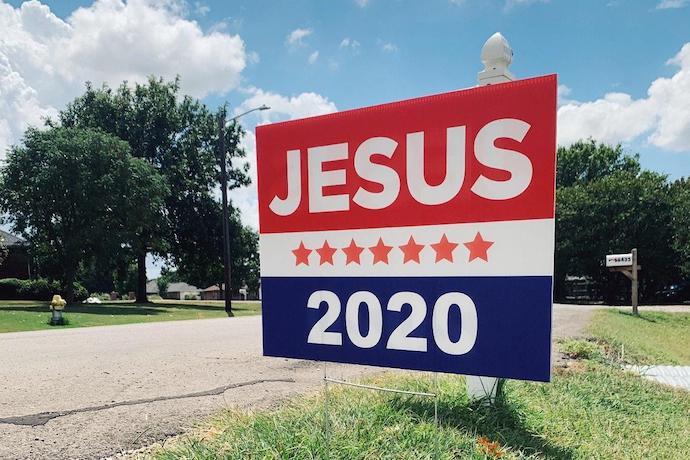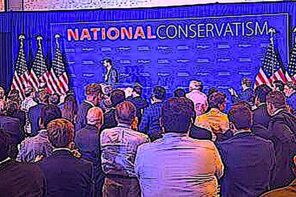The 2020 results of Ligonier Ministries’ and Lifeway Research’s State of Theology Survey, a project published every two years since 2014, are causing a minor moral panic in the evangelical information ecosystem, including flagship “respectable” evangelical periodical Christianity Today and “hip,” youth-oriented evangelical magazine Relevant. The latter’s headline, “Report: A Third of American Evangelicals Don’t Believe Jesus Was God” is more typical of most coverage, but CT’s headline, “State of Theology: Evangelicals Hold Steady on Doctrine, More Outspoken on Politics,” gestures toward what will be more of interest to observers of the Christian Right in an election year.
In order to understand the significance of something like the State of Theology Survey, however, it’s crucial to understand that for the vast majority of white evangelicals—America’s most loyal pro-Trump demographic—there is no clear line between doctrine and politics. Indeed, many evangelicals maintain, as ardently as any stereotypical Marxist your imagination can conjure, that the “correct” worldview and “correct” politics are inextricably intertwined.
The arch-Calvinist Ligonier Ministries’ “analysis” of its State of Theology Survey is one of the most tendentious, fear-mongering documents pretending to be social science that you could ever hope to find. It concludes that “Evangelicals, while exhibiting some hopeful movement in the direction of biblical fidelity, also seem to be influenced by the culture’s uncertainty about what truth is, who Jesus is, and how sinners are saved,” adding, “These results reveal an urgent need for clear biblical teaching.”
Such sentiments are not atypical. For example, prominent never-Trump conservative commentator David French maintains, unconvincingly, that a better “political theology” would prevent his fellow evangelicals from jumping on the bandwagon with the kinds of wild conspiracy theories that are widespread among them.
Meanwhile, George Barna, who runs his own conservative Christian polling outfit, recently agreed with Tony Perkins, president of the Family Research Council (an SPLC-designated anti-LGBTQ hate group), on the solution to America’s “spiritual deficiency”: rather than discuss politics overtly, churches should simply better instruct their congregants in “the biblical worldview,” which will naturally lead to orthodox social conservative politics.
Thus, according to Barna, evangelicals have a responsibility to make sure their children develop the proper worldview from very early childhood. Lamenting that “Most people will die believing what they believe at age 13,” Barna said, striking a panicked tone similar to Ligonier’s write-up of its State of Theology Survey, “It’s got to come from the family, as well as the church. But we have to pay attention to the fact that the culture of America is the biggest shaper of people’s worldview right now.” Such fears drive many evangelicals’ dedication not only to keeping their children out of public schools (opting for homeschooling or Christian schools that teach their preferred “alternative facts” instead), but also to undermining public education to make it easier to indoctrinate children in right-wing extremist ideology.
Naturally, that ideology includes opposition to LGBTQ rights, and the 2020 State of Theology Survey approvingly observes a decline in the percentage of evangelical respondents who agree with the statement “Gender identity is a matter of choice,” from 32% in 2016 to 22% in 2020. Of course, because fear is how conservative evangelicals sell their politics, the write-up notes, “Yet it remains concerning that one in five evangelicals still appears to reject the Bible’s teaching that our gender as male or female is given by God our Creator.”
The write-up then transitions to a question about politics by stating, “As these ethical discussions and other social issues are featured prominently in political discourse, this raises the question of how Christians should be involved in politics. In this U.S. presidential election year, evangelicals express strong support for the freedom of Christians to join the debate,” noting that only 16% of evangelical respondents agree with the statement, “Christians should be silent on issues of politics.”
But, given the obvious ideological motivations behind the survey, can even its raw data be regarded as meaningful? The project’s methodology is murky, and, based on the information available to the public, shoddy. Noting that the survey uses Southern Baptist outfit Lifeway Research’s distorting category of “evangelical by belief” to define evangelical respondents is just scratching the surface.
I reached out to sociologist of religion Andrew Whitehead and political scientist Paul Djupe, both of whom research evangelicals and politics, for comment. Both Whitehead and Djupe immediately observed that the lack of information on the response rate and the obscuring of differences of opinion over theology among evangelicals call the survey’s results into question.
Referring to a white paper on Lifeway’s methods that he called “light on details,” Djupe noted, “If the data were gathered from a reliable online panel and Census quotas were applied, then this is a procedure used by many academics. We tend to believe that such samples can reliably test statistical relationships, but may not yield as reliable of estimates as probability samples taken over a phone or another method. That is, we tend to be somewhat skeptical of population estimates produced by such data.”
Asked what they thought the purpose of the 2020 State of Theology Survey might be, and whether it might be geared toward driving evangelicals to the polls, Whitehead replied, “I do think there is a particular narrative that they are trying to push with this research. That is made clear with the ‘true or false’ buttons. Whether getting evangelicals to the polls is the ultimate aim I cannot say, but it does seem plausible to me.” Djupe also opined on what might be motivating the project:
I view the survey as an attempt to assess how many ‘good evangelicals’ there are, how many there could be if appropriately taught (from their perspective), and how much the culture stands in opposition to their preferred theological beliefs. To me, it suggests some internal division among evangelicals and highlights the continual battles for purity and perceived rightness within the subculture. Through the survey, the sponsors are playing reporter with a mission to be a teacher, pressing a particular definition and set of normative beliefs. I do not necessarily think that the questions as written are biased, merely that the question set is meant to engage a social desirability effect of leading respondents and readers to see what the ideal type consists of.
At the end of the day, the particular findings of Ligonier’s 2020 State of Theology Survey with respect to evangelical respondents’ attitudes and trends may or may not precisely reflect America’s evangelical population. Nevertheless, the project and its packaging neatly illustrate white evangelicals’ political and social concerns, and they certainly do nothing to call into question the likelihood that the white evangelical electorate will once again give Donald Trump 80% or more of its vote.





